Jerry Springer through the Time Portal! Tom Holland’s Dynasty: The Rise and Fall of the House of Caesar
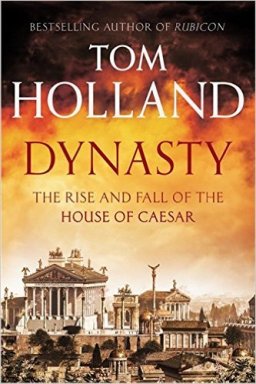
The wildest period of Roman political history — from the rise of Augustus, through Tiberius, Caligula and C… C… Claudius, to the demise of Nero — is also the hardest to follow.
There are just too many unfamiliar names and too many repeated names — thanks to Roman naming conventions, there are, e.g., more Julias than you can shake a stick at. Worse, people don’t just marry for politics, they divorce for it, and even adopt for it.
Thus you have Emperor Tiberius, son of Emperor Augustus’ second wife Livia by her first husband but adopted by Augustus (originally called Octavian, by the way) adopting his nephew Germanicus who then marries Agrippina (the first: there are two Agrippinas ) daughter of Julia by her first marriage with Marcus Agrippa. Julia, of course, was the daughter of Augustus by his first wife Scribonia, and not to be confused with Julia’s grandmother, daughter or granddaughter of the same name.
I hope you’re following that?
But really, you’re probably having difficulty hearing me over the sound of a million Ancient Romans chanting, “Jerry! Jerry!”
Because it is like a Jerry Springer show, except with more exiles, more murder, and more death by starvation or ritual suicide.
Despite, or because of this, the period is a favorite fictional setting. Robert Graves’ I, Claudius is the classic, but Simon Scarrow’s excellent Eagle series romps through the military thread. And of course we have the screen adaption Graves’ book plus the more recent BBC Rome.
Personally I have difficulty following even fictionalised renditions of this mayhem! For this reason I was intrigued to get a review copy Tom Holland’s Dynasty: The Rise and Fall of the House of Caesar.
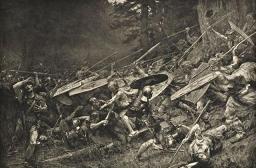
I’m starting to think of Holland as “the heir to Harold Lamb.” He has the knack of weaving good narrative history out of meticulous research, sometimes drawing on the more dubious but colorful sources, but smoothly flagging them as rumor without descending into historical debate or debated history.
This book is less bellicose than his Persian Fire (though he does treat us to an atmospheric account of the Battle of Teutoburg Forest in which rather too many legions trudge into a rather too well-laid ambush in the dark forests of Germany). Instead it leads us through the insanely personal political history.
The period is still confusing. I was glad I had a hardcopy and not an ebook — it made it easier to flick back to the several maps and family trees, or forward to the gloriously snarky Dramatis Personae in which Remus is listed as dying “in mysterious circumstances”. There are some pretty photos as well, all relevant to the text, but nice to have rather than essential.
And thanks to Holland, the period starts to make a some kind of sense.
Overshadowing everything is the Civil War, in which Rome’s great and bad rampaged around the empire degrading Roman fighting power while destabilising their own society. Once Octavius had schemed his way to top dog and become Augustus, the memory of that war was so very bad that nobody wanted to risk one ever again. Douglas Adams once joked about “voting for a lizard in case the wrong lizard got it”. The Romans were in the situation of having to “support a lizard emperor in case the other lizards kill and eat everybody”. This explains in part why Augustus and his successors could behave the way they did.

So we have Augustus, a messianic mob boss with better intentions than motivations, who genuinely saves Rome from itself, but for himself and his heirs. This last is a problem, perhaps because his second wife Livia is — allegedly — good with poison… so it is Livia’s son Tiberius who — reluctantly — becomes earmarked as the next emperor. Meanwhile, we see Augustus turn proto-Victorian morality cop, with harsh punishments for adulterers, including his own daughter. This gives us the tragicomic tale of the super-urbane poet Ovid banished to a semi-civilised Black Sea city where passing barbarians routinely wake him with a rain of arrows on his roof and those of his furry-trousered neighbours, and where he comes to the belated realisation of the significance of the Imperial Peace.
Tiberius first appears as a kind of Maximus figure, a great general who really doesn’t want political power and was prepared to weather exile in order to avoid it. However, he quickly segues from Wellington — great general, poor politician and very conservative — to Cromwell — disillusioned with the senate, which he then marginalises — to a nightmare vision of Michael Jackson in his very own debauched Neverland on the island of Capri. His arc would be tragic if it were not also so very gross.
Next up is Caligula, the last of the Caesars who can claim any actual descent from Caesar.
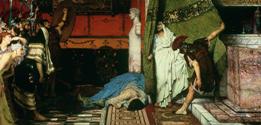
A survivor of Tiberius’ Capri, Caligula embarks on a reign of popularist terror so hedonistic that it makes that film (you know the one) seem mild in comparison. Very much the Joker (with no Batman to rein him in), there is a method to his apparent madness. With actions like bridging the Bay of Naples so he can drive a chariot over it, Caligula’s proving his own divinity through the exercise of raw power — power and divinity are almost the same thing for the Ancients. By murdering and/or humiliating and corrupting the senatorial class, he’s mounting a one-man cultural revolution designed to woo the plebeians. Even so, he still comes across as a sadistic sociopath, so much so that it’s a relief when he’s foolish enough to bully a Praetorian guardsman with an itchy trigger finger, as it were.
Famously, having killed the Emperor, the Praetorian guard hunt the palace for a replacement and find the poor, scholarly, speech-impaired Claudius hiding behind a curtain. Scholarly turns out to be a good thing, and much like the later Julian the Apostate, Claudius makes a good — if sporadically murderous — job of emperoring (or is it “imperatoring”?), right up until the point he dies in mysterious wife-enhanced circumstances, so making the way for Nero.
Nero starts well, then does the whole adolescent rebellion thing by murdering his mentors and his mother.
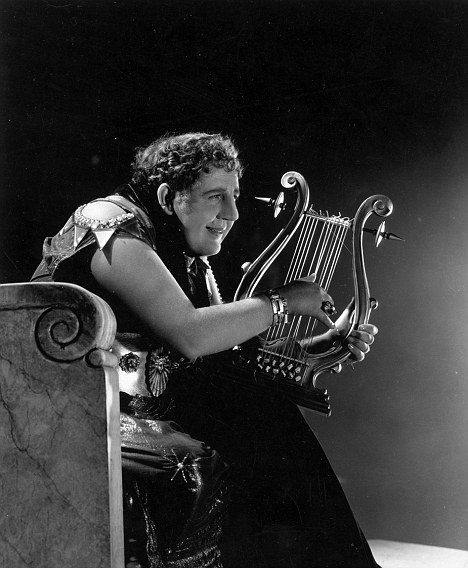
Holland is… sympathetic is not quite the right word… to Nero. He gets him.
Though several dozen legionaries short of a full century, Nero is not just any obese wife-beating tyrannical serial killer with an army at his back; he’s also an artist. He wants to reshape the world in his own image, and to have his artistry justly appreciated. Holland paints him as less embarrassing than depicted; an adept showman able to play the crowd. Even his taking over the Olympics was seen as godlike — again, power equals divinity — and his attempt to race with too many chariot horses, heroic.
Nero is still creepy, though. Even if you discount all the murders and executions you’re still left with his… um… extensive remodelling of a young man into the doppelganger of his dead wife. (Ewww.)
Of course, Nero goes too far while too far away, and the surviving power brokers turn against him. He meets his deservedly sordid end with comical cowardice worthy of a Frankie Howard sketch.
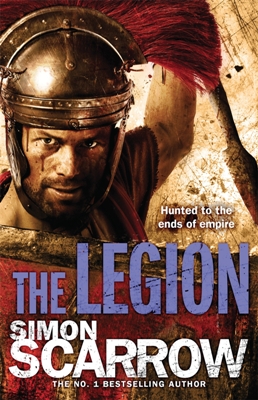
Overall, it is not an edifying tale that Tom Holland weaves. Right prevails only when it is might, and virtue is its own hazard. However, he brings out several themes.
First, the strange interplay between appearances and realpolitik. There’s no constitution making Augustus and his successors into emperors. Their formal power comes from a patchwork of traditional offices and supposedly one-off privileges granted them by the Senate. Their actual power comes from the ability to have people arbitrarily murdered, which in turn comes both from the bought and paid for Praetorian Guard, and from the sporadically loyal plebeians.
Second, is the way that what are technically tyrants — as in “illegal holders of personal power” — bootstrap their legitimacy through increasingly tenuous hereditary connections to Julius Caesar, also a tyrant, but now deified.
Finally, there is the sheer personal power arbitrarily exercised by the Caesars for reasons ranging from pragmatic, through whimsical, to sadistic. It is easy to see why they would be regarded as godlike and why they should mistake themselves for gods.
However, ultimately, it is hard to feel any nostalgia for an era with living deities such as these…
Read Dynasty: The Rise and Fall of the House of Caesar if you want to understand power and tyranny from the inside, or if you enjoy a good political yarn, or if you simply want some context for all the fiction that takes root in this dynamic but unpleasant milieu.
M Harold Page is the sword-wielding author of works such as Swords vs Tanks (Charles Stross: “Holy ****!”). For his take on writing, read Storyteller Tools: Outline from vision to finished novel without losing the magic. (Ken MacLeod: “…very useful in getting from ideas etc to plot and story.” Hannu Rajaniemi: “…find myself to coming back to [this] book in the early stages.”)
Don’t forget the most famous Science Fiction treatment of this period, A. E. Van Vogt’s EMPIRE OF THE ATOM. (Which I discussed recently at my blog.)
In the queue. Treading familiar ground, sure. But it’s familiar because I LIKE to tread it.
I should have a go at this book. I’ve got a large-cast project with a mad king and an order of royal murderers who aren’t that thrilled with how their mad king is using them.
Elsewhere I’ve seen the claim that people tried to flee the Colosseum when Nero forced them to attend his musical performances because they feared they would be unable to avoid laughing. I imagine he sounded sort of like the notorious Florence Foster Jenkins. Actually, Jenkins was so sublimely bad she came out the other side. Could Nero possibly have been this entertaining?